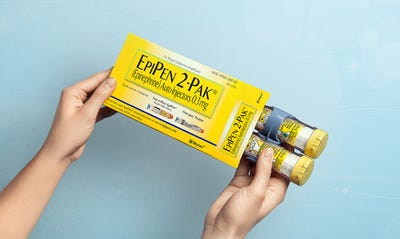Did EpiPen Maker Fudge Profit Numbers?
September 27, 2016
Mylan's profits for the drug delivery device were 60% higher than what the company's CEO told Congress, according to The Wall Street Journal.
Nancy Crotti
 Mylan N.V. earned about 60% more on its EpiPen two-pack than the figure given to Congress last week, according to a document filed with the Securities and Exchange Commission.
Mylan N.V. earned about 60% more on its EpiPen two-pack than the figure given to Congress last week, according to a document filed with the Securities and Exchange Commission.
The Wall Street Journal pointed out the discrepancy between the $100-per-pack profit figure that Mylan CEO Heather Bresch gave the House Government Oversight Committee and the actual profit of $166. The difference came from the 37.5% U.S. corporate tax rate that Mylan's SEC filing claimed it paid on each pack, which lists for $608. That tax rate was five times more than Mylan paid last year, the Journal noted.
Pharmaceutical giant Mylan is seeking to appease customers and politicians angry over it continually hiking the price of its combo drug and device used to treat severe allergic reactions. I
Mylan claimed that the Journal's story was misleading, and provided the following statement: "Tax is typically included in a standard profitability analysis and the information provided to Congress has made clear that tax was part of the EpiPen Auto-Injector profitability analysis. In fact, Mylan has provided Congress with a detailed analysis of EpiPen Auto-Injector profitability. It also is important to note that use of a statutory tax rate for the jurisdiction being analyzed (in this instance, the U.S.) is standard. Just as we did not use a blended global tax rate, we also did not allocate corporate expenses associated with running the business, which would have further reduced its profitability. We believe it is most appropriate, and conservative, to focus entirely on EpiPen Auto-Injector specific costs and associated taxes."
An analyst told the Journal that the 37.5% tax rate "has nothing to do with reality." Ryan Baum of SSR Health LLC, a healthcare investment research firm in Stamford, Conn., said Mylan actually paid an overall tax rate of 7.4% last year, and "a negative effective tax rate in the U.S. due to a negative provision for deferred taxes," the newspaper noted.
Sanford C. Bernstein analyst Ronny Gal told the Journal that the 37.5% figure would have been correct "if EpiPen was its own company." But Mylan's efforts at tax reduction have produced a much lower rate, Gal said.
Mylan increased the price of a set of two EpiPens from around $100 a few years ago to closer to $600, for no apparent reason. Last year, the company moved its headquarters from Canonsburg, PA, to the Netherlands for tax purposes, although it still manages its affairs from Pennsylvania.
"We didn't believe Mylan's numbers last week during their CEO's testimony, and we don't believe them this week either, which is why we gave them 10 days from the date of our hearing to produce their internal files," said U.S. Rep. Elijah Cummings of Maryland, the ranking Democrat on the House Oversight Committee. "They have until this Friday to give Congress the underlying documents we asked for back in August so we can finally determine the company's actual profits in each year for the last decade."
Nancy Crotti is a contributor to Qmed.
Like what you're reading? Subscribe to our daily e-newsletter.
[Image courtesy of Mylan]
About the Author(s)
You May Also Like

.png?width=300&auto=webp&quality=80&disable=upscale)
